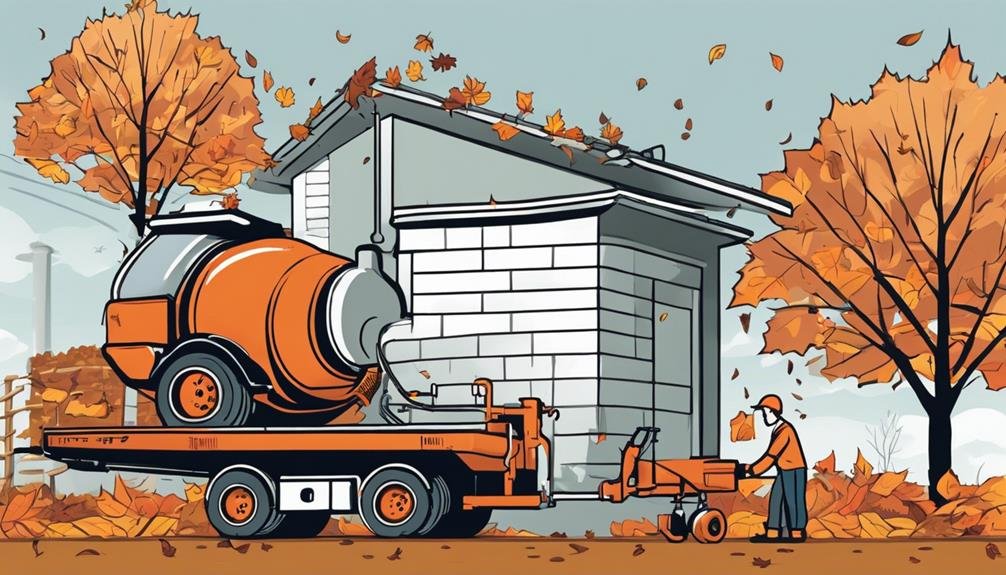You know the old saying, 'An ounce of prevention is worth a pound of cure.' When it comes to maintaining your septic tank, this rings especially true.
From spring's thaw to winter's chill, taking care of your septic system is crucial for its longevity and efficiency. But what are the most important tips to keep in mind for every season?
Stay tuned to discover the key strategies that will help you avoid costly repairs and ensure your septic tank functions smoothly year-round.
Key Takeaways
- Regularly inspect and maintain septic tank system year-round for optimal performance.
- Implement seasonal maintenance tasks to prevent system problems and ensure longevity.
- Schedule professional inspections at least once a year to address potential issues early.
- Use enzyme-based cleaners and avoid harsh chemicals to preserve bacterial balance in the tank.
Spring Maintenance Tips

When preparing your septic tank for the spring season, remember to thoroughly inspect the drainage field for any signs of clogging or damage. Start by conducting a soil inspection to ensure the soil around the drainage field is suitable for optimal wastewater treatment. Look for any signs of standing water, foul odors, or unusually lush vegetation, as these could indicate problems with the drainage system.
Next, perform a detailed drainage evaluation. Check the area for any pooling water, which might suggest a blockage in the pipes or a saturated drain field. Inspect the ground for any soft spots or unusually damp areas, as these could be signs of leaks or septic system overload. Ensure that all the components of the drainage field, including the pipes, distribution box, and soil absorption area, are functioning correctly.
Summer Maintenance Strategies
To effectively maintain your septic tank during the summer months, implement a regular pumping schedule to prevent system overload and ensure optimal performance. The heat of summer can accelerate the breakdown of waste in your septic tank, increasing the need for more frequent pumping. By sticking to a consistent pumping schedule, you can prevent issues like backups and odors, keeping your system running smoothly.
Another crucial aspect of summer septic tank maintenance is monitoring the drain field. Make sure no heavy objects are placed on top of the drain field, such as vehicles or construction materials, as this can compact the soil and disrupt the natural filtration process. Additionally, avoid planting trees or shrubs too close to the drain field, as their roots can penetrate and damage the pipes.
Regularly inspecting the drain field for any signs of standing water, foul odors, or overly lush vegetation can help catch potential problems early. By following these summer maintenance strategies, you can prolong the life of your septic system and prevent costly repairs down the road.
Fall Septic Tank Care

As the summer months come to an end, ensuring proper fall septic tank care is crucial to maintaining the functionality and longevity of your system.
One essential task for fall septic tank care is leaf removal. Leaves can clog pipes, leading to backups and potential system failures. Regularly rake and remove leaves from the area around your septic tank to prevent any issues.
Another vital aspect of fall septic tank care is soil inspection. Check the soil around your septic tank for any signs of saturation or pooling water. Soggy soil could indicate a problem with your system, such as a leak or overflow. If you notice any concerning changes in the soil condition, it's advisable to contact a professional for further assessment.
Winter Maintenance Recommendations
For optimal winter maintenance of your septic tank system, prioritize regular inspection of the tank and surrounding components. Winter preparation is essential to prevent potential issues that may arise due to freezing temperatures.
Inspect the tank for any signs of damage or leaks, paying close attention to the pipes and the drain field. Ensure that the tank is properly insulated to protect it from the cold. Snow removal around the septic tank area is crucial to prevent excess moisture from seeping into the system. Excessive snow accumulation can also put pressure on the tank and pipes, potentially causing damage.
Regularly check for any signs of snowmelt runoff heading towards the septic system, as this can overwhelm the system and lead to failure. If you notice any pooling water or damp areas, take immediate action to redirect the flow away from the tank.
Year-Round Maintenance Essentials

Prioritize consistent monitoring and maintenance tasks to ensure the optimal functioning of your septic tank system throughout the year. Regular inspections are crucial to catch any issues early on before they escalate into costly repairs. Schedule professional inspections at least once a year to assess the health of your septic system thoroughly. Additionally, conduct your visual checks monthly to monitor for any warning signs such as slow drains or odors around the tank area.
Drain cleaning is another essential aspect of year-round septic tank maintenance. Regularly clean your drains using enzyme-based cleaners to prevent clogs and maintain the proper flow of wastewater. Avoid using harsh chemicals that can disrupt the natural balance of bacteria in your septic tank. Consider implementing preventive measures such as installing drain filters to trap debris and prevent it from entering your septic system.
Frequently Asked Questions
How Often Should I Have My Septic Tank Pumped?
You should have your septic tank pumped every 3-5 years to prevent buildup and maintain proper functioning. Regular maintenance is essential to avoid costly repairs. Consult a professional to determine the ideal pumping frequency for your system.
Are There Any Household Products I Should Avoid Using to Prevent Damage to My Septic Tank?
Avoid using harmful chemicals like bleach or drain cleaners as they can disrupt the balance of your septic tank. Stick to biodegradable products and avoid DIY remedies that may harm your system. Follow restrictions for a healthy tank.
What Are the Signs That My Septic Tank Needs Repairs or Replacement?
If you notice persistent sewage backups, foul odors, or overly lush grass near the tank, these are signs your septic tank needs repairs or replacement. Timely maintenance can prevent costly issues. Regular inspections are crucial.
Can Landscaping Around My Septic Tank Affect Its Performance?
When you landscape near your septic tank, remember restrictions for planting. Roots can cause drainage issues. Keep plants at a distance to ensure your system works properly. Properly maintained landscaping aids in septic performance.
Are There Any Government Regulations or Permits I Need to Be Aware of for Septic Tank Maintenance?
To ensure compliance with septic tank maintenance regulations, check local government requirements for permits. Proper maintenance is crucial for system longevity. Regular inspections and pump-outs are essential. Stay informed to avoid potential fines and keep your septic system running smoothly.
Conclusion
In conclusion, by following these top septic tank maintenance tips for every season, you can ensure that your system operates efficiently year-round. Regular maintenance is key to preventing costly repairs and maintaining the health of your septic tank.
Remember to schedule routine inspections and pumpings, practice water conservation, and be mindful of what you flush down the drain. By taking these proactive measures, you can prolong the life of your septic system and avoid potential issues in the future.

